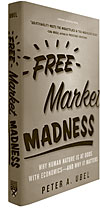Irrational Individuals
A review of Free Market Madness, by Peter A. Ubel.
(originally published by Booz & Company)Free Market Madness: Why Human Nature Is at Odds with Economics — and Why It Matters
By Peter A. Ubel
Harvard Business Press, 2009, 272 pages
 Peter A. Ubel, a physician, behavioral scientist, and professor of medicine and psychology at the University of Michigan, challenges an even more basic assumption of classical economics — that people behave rationally in economic matters. In Free Market Madness: Why Human Nature Is at Odds with Economics — and Why It Matters, he argues specifically with the libertarian, free market evangelists who tout the unregulated marketplace as the solution to all ills. His book is an accessible guide to the evidence that people do not behave as microeconomists would like them to, and to the implications of this for public policy. Ubel sums up his central message as follows: “We humans are not as rational as some libertarians would have us believe, and therefore the free market puts us in a position to harm ourselves. To make matters worse, the free market often rewards those people who understand consumer behavior well enough to exploit our weaknesses. Because the free market fails to protect consumer interests, a good government should find appropriate ways to protect us from ourselves.”
Peter A. Ubel, a physician, behavioral scientist, and professor of medicine and psychology at the University of Michigan, challenges an even more basic assumption of classical economics — that people behave rationally in economic matters. In Free Market Madness: Why Human Nature Is at Odds with Economics — and Why It Matters, he argues specifically with the libertarian, free market evangelists who tout the unregulated marketplace as the solution to all ills. His book is an accessible guide to the evidence that people do not behave as microeconomists would like them to, and to the implications of this for public policy. Ubel sums up his central message as follows: “We humans are not as rational as some libertarians would have us believe, and therefore the free market puts us in a position to harm ourselves. To make matters worse, the free market often rewards those people who understand consumer behavior well enough to exploit our weaknesses. Because the free market fails to protect consumer interests, a good government should find appropriate ways to protect us from ourselves.”
These are fighting words to those who fear the rise of a “nanny state” that undermines the exercise of free will and the acceptance of personal responsibility. But the author goes about his task calmly as a self-described “flaming moderate.” He shows us evidence that our stocks of self-control are finite. This is readily apparent in our eating habits, where the stress of everyday living and working can erode our intentions to eat healthily. This may account for the fact that obesity rates are 25 percent higher among low-income women than they are among high earners of the same age, and are rising fastest in some of the poorest areas in the world.
The work of Nobel Prize winners Daniel Kahneman and the late Amos Tversky, the founders of behavioral economics, is referenced throughout the book. We learn, too, of the views of their intellectual predecessors, such as Jeremy Bentham and David Hume, as well as their successors, such as University of Chicago professor Richard Thaler and his colleague and coauthor Cass Sunstein, who was named as President Barack Obama’s administrator of the White House Office of Information and Regulatory Affairs. Ubel’s academic perspectives are leavened throughout the book with stories from his experiences as a physician, through which he has firsthand encounters with smokers who can’t quit and overweight people who can’t diet. It is this combination of the theoretical and the practical, along with the author’s ability to move smoothly between the two, that gives the book its charm.
Author profile:
- David K. Hurst is a contributing editor of strategy+business. His writing has also appeared in the Harvard Business Review, the Financial Times, and other leading business publications. Hurst is the author of Crisis & Renewal: Meeting the Challenge of Organizational Change (Harvard Business School Press, 2002).


